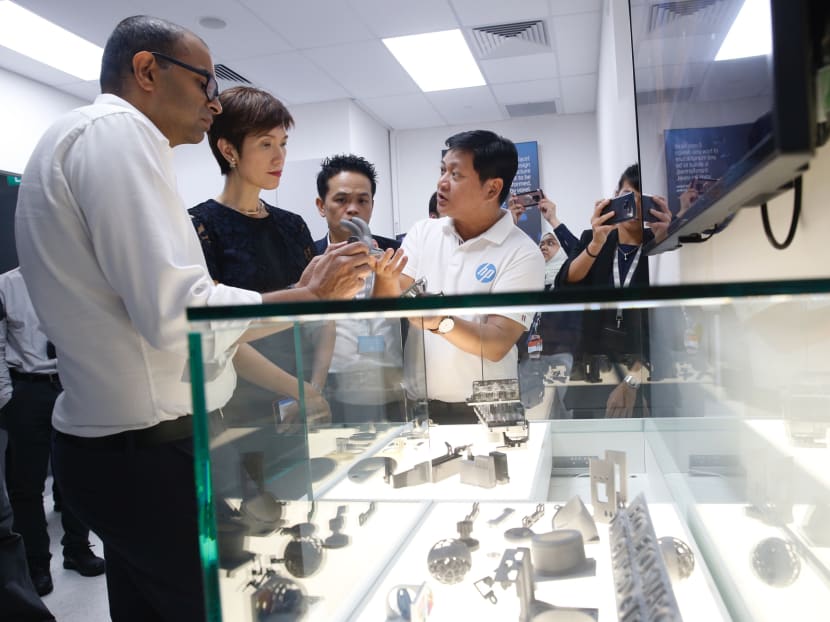Growth in ICT sector as mid-career workers seek to re-train and find new roles in industry
SINGAPORE — Resident employment in the info-communications and technology (ICT) sector grew by 4,000 from last July to this June, Manpower Minister Josephine Teo said, highlighting how government agencies have been working to engage companies to re-train workers for emerging job roles.

Dr Janil Puthucheary (left), Senior Minister of State for Communications and Information, and Minister for Manpower Josephine Teo (second from left) looking at 3D printed models at HP Singapore’s Smart Manufacturing Applications and Research Centre on Nov 2, 2018.
SINGAPORE — Resident employment in the info-communications and technology (ICT) sector grew by 4,000 from last July to this June, Manpower Minister Josephine Teo said, highlighting how government agencies have been working to engage companies to re-train workers for emerging job roles.
If foreign workers are included, the growth would be about 6,000, making it an increase of about 4.5 per cent.
During the same period, some 900 professionals, managers, executives and technicians (PMETs) were reskilled to join the ICT sector through the Government’s Adapt and Grow initiative —which also offers, among its suite of services, career guidance and support.
Speaking to the media on the sidelines of a tour of technology firm HP Singapore on Friday (Nov 2), Mrs Teo said it was encouraging to note that workers who see the opportunities in the sector included those who took up new job roles within their workplaces.
“I think (this) is to be encouraged. It means that the companies are creating growth opportunities, and their own workers and employees are able to benefit from them,” she said.
As of June, there were 137,800 resident and foreign workers in the ICT sector, making up 3.7 per cent of total employment across all industries.
Workforce Singapore — a statutory board under the Ministry of Manpower which oversees the transformation of Singapore’s workforce and industries to meet economic challenges — said that an estimated 13,000 new jobs for PMETs may be created in the ICT sector by 2020. There will be jobs in areas such as cyber security, the Internet of Things, as well as artificial intelligence and data science.
Dr Janil Puthucheary, Senior Minister of State for Communications and Information, who was with Mrs Teo touring HP Singapore, told reporters that the ICT sector is a “key enabler for the rest of economy” in Singapore.
Mrs Teo commented that it has taken “some time” for both employers and jobseekers to understand that the “plug-and-play type of job match isn’t always possible”. Last year, when she spoke about tapping mid-career workers as the country’s “third source” of manpower stream, she said that not enough businesses were unlocking the talents of these workers, preferring to “plug and play”, or hire workers with the pre-requisite skills so that they can “hit the ground running”.
She said on Friday: “The labour market tends to be quite tight, (but) there are many growth areas. In some of these growth areas, the skills are short — not only in Singapore, but worldwide.”
To help employers “bridge the gap” and meet the skills requirements, there is the Professional Conversion Programme (PCP), Mrs Teo said.
The programme allows PMETs, including mid-career workers, to pick up new skills and move into new occupations or sectors, and is managed by Workforce Singapore.
TAKES COURAGE TO CONVERT SKILLS
Mrs Teo acknowledged that it would take “courage and determination” and “some getting used to” to make a mid-career switch, and these workers faced certain anxieties, such as whether it was a jump that was “too wide”, or an “adjustment so challenging that they would not be able to surmount it”.
“We recognise that it does involve not just skills acquisition, but (they) also (have to re-invent) themselves,” Mrs Teo added.
On Friday, Mrs Teo and Dr Puthucheary met employees who have been re-trained for new job roles under the PCP.
One of them was supply chain analyst Sam New, 46, who was among the pioneer batch of employees there who went for the PCP for data analysts.
He is among 42 HP Singapore employees who have completed the programme, which has been administered by the National University of Singapore’s Institute of Systems Science since 2016.
Mr New has been with HP Singapore for 24 years and has been in the supply chain team for 10 years. Seeing a “great opportunity to upskill and develop a data analytics mindset”, Mr New went for the PCP, and now leads the implementation of his department’s data analysis projects.
When he was on the PCP, Mr New said that he had to be away from work for one month for "intensive classroom training”, and that the curriculum was "packed” with many topics, but he was glad to have received guidance from the programme’s mentors.
Now, he mentors his colleagues in data and supply chain analytics.
Mr New's colleague, 30-year-old product engineer Tng Jia Xin, who also went for the PCP, said: "You’ll have to do coding on your own, test, analyse and build your own analytics model, and put it all into your very own visualisation dashboard."
Ms Tng, who has been with HP Singapore for six years and started as a process engineer, added: "The programming skills I have learnt (have) made my work less mundane, increasing my productivity. I also learnt to use various tools to efficiently analyse data in the shortest time."









